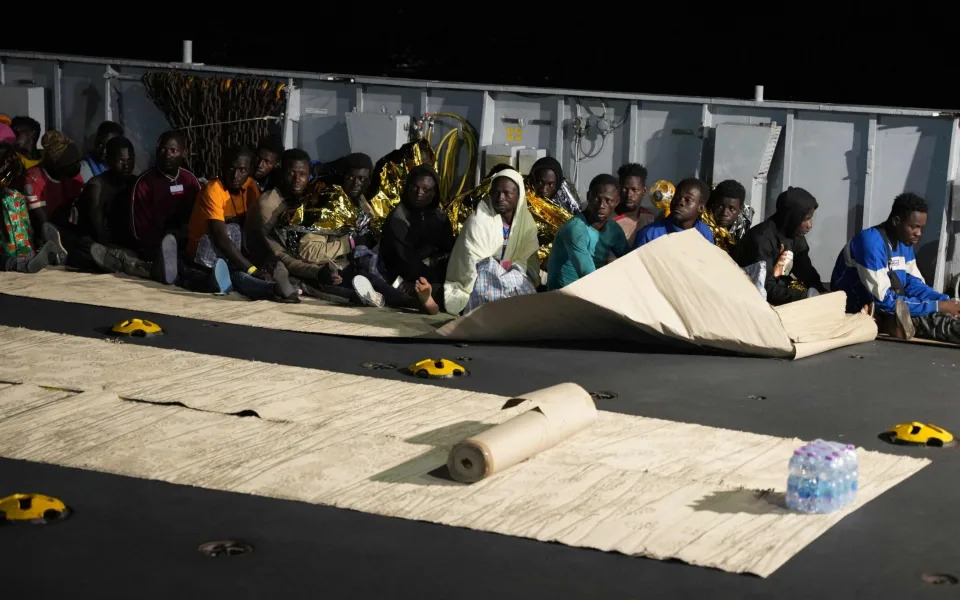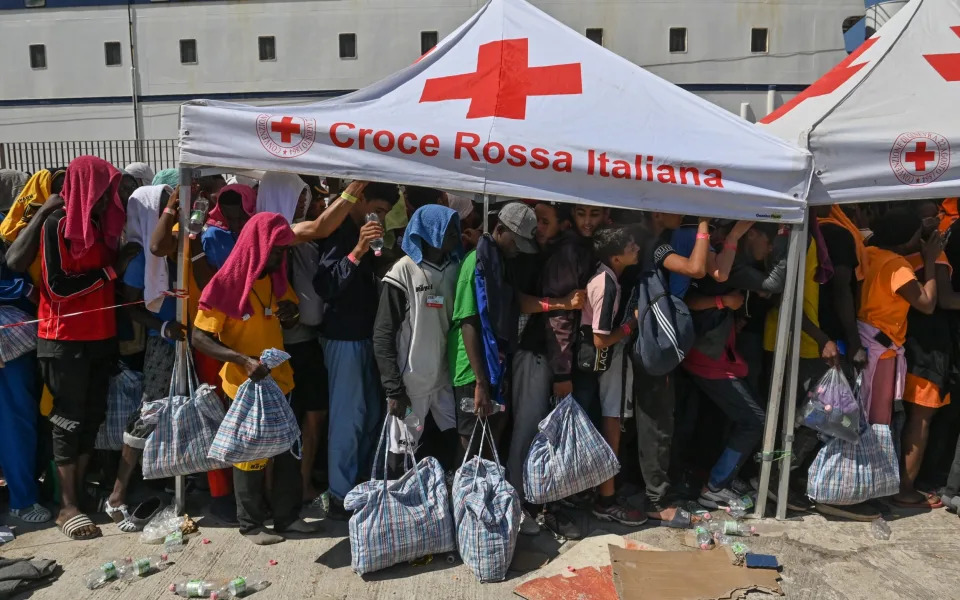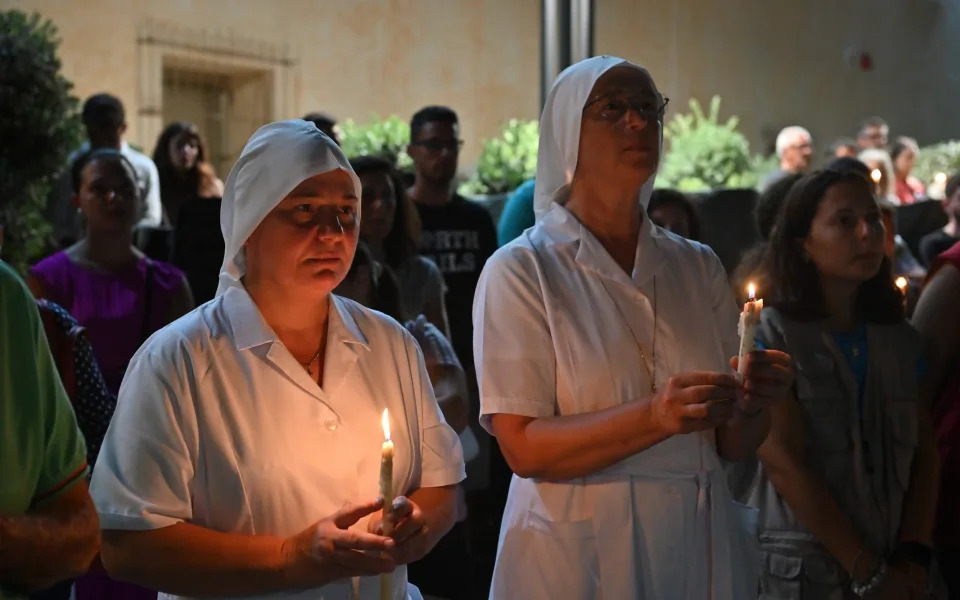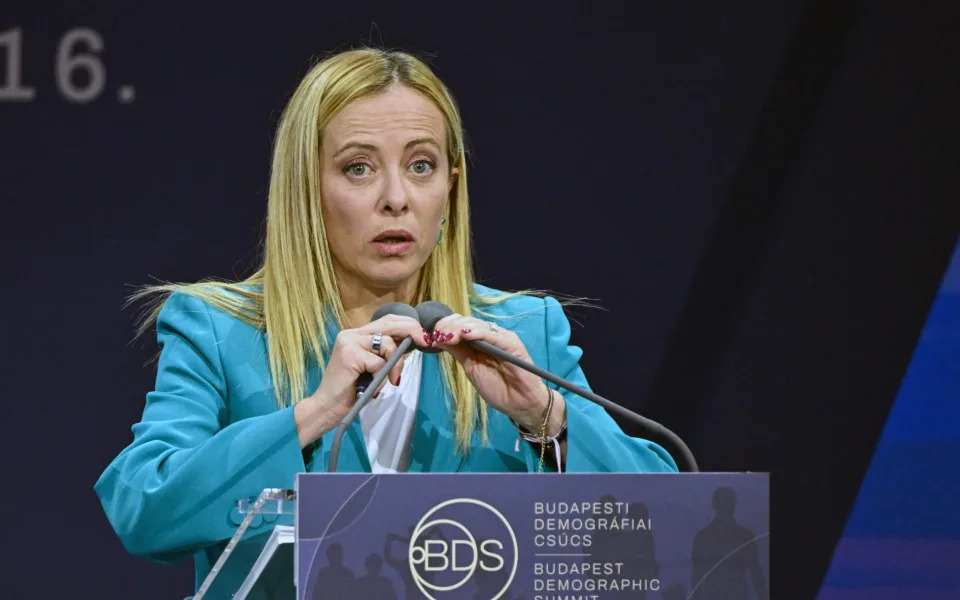Meloni tells EU to blockade migrants and save ‘future of Europe’
Giovanni Legorano
Sun, 17 September 2023

Ursula Von Der Leyen and Giorgia Meloni speak during the migrant crisis in Lampedusa - Anadolu/Anadolu
Giorgia Meloni said the future of Europe depends on how the bloc handles a growing migration crisis, as she demanded EU leaders create a naval blockade in the Mediterranean to stop the flow of small boats.
The Italian prime minister’s remarks were directed at Ursula von der Leyen, the European Commission president, who was visiting the tiny island of Lampedusa, off North Africa. More than 10,000 migrants arrived there last week alone, more than the entire 6,000-strong population of the island.
“What is at stake is the future of Europe because the future of Europe depends on its capacity to deal with the huge challenges of our time,” Ms Meloni said, speaking to reporters with Mrs von der Leyen.
She said that the only “serious” way to address the issue is to stop the migrants from departing from North African countries, especially Tunisia.
In return, Mrs von der Leyen pledged the swift return of “irregular” migrants and a crackdown on the “brutal business” of migrant smuggling.
During the visit Ms Meloni repeated her calls for the EU to support the launch of a naval mission to block migrants from reaching Italian shores.

The leaders went to see dozens of small boats, on which hundreds of migrants have arrived in recent weeks in Lampedusa - FILIPPO ATTILI/EPA-EFE/Shutterstock/Shutterstock
European leaders have been at odds for years over how to address the surge in arrivals of irregular migrants to the continent.
If the current trend continues at the pace seen so far this year, arrivals in Italy could overtake the 160,000 record seen in 2016. As of Friday, 126,000 migrants had entered Italy since the start of the year, nearly double the arrivals in the same period of 2022.
Showing she can curb the arrivals of migrants in Italy is a particularly urgent political issue for Ms Meloni. She promised to crack down on the traffickers and stop the boats, telling supporters that for migrants “the gravy train is over” and she pledged a naval blockade to protect Italy’s coasts. None of that has happened.
Instead, Italians saw continuous arrivals of migrants, most of them to Lampedusa, straining care and reception efforts and forcing the government to race against the clock to transfer them to other parts of Italy, amid street protests by many residents in Lampedusa.

Immigration is a serious political issue for the Italian prime minister - YARA NARDI/Reuters
In response to the disastrous situation that built up last week on the tiny island, some European allies softened their stances on migration.
France’s President Emmanuel Macron expressed his solidarity in a phone call with the Italian prime minister on Saturday, as the two agreed on the need for a “European-level” response. French Interior Minister Gerald Darmanin, who in May branded Ms Meloni and her government as “incapable” of solving the migration problem for which they had been elected, said he will visit Lampedusa in the coming days to meet his counterpart.

Migrants on the deck of a rescue vessel in a harbour on Lampedusa - ZAKARIA ABDELKAFI/AFP
Germany’s Interior Minister Nancy Faeser said on Friday her country had decided to keep taking in migrants and refugees arriving in Italy, two days after it announced the suspension of a voluntary agreement with Rome to receive new arrivals.
After visiting Lampedusa, Mrs von der Leyen tried to reassure Ms Meloni that the EU would step up efforts to help Italy.
“Italy can count on the European Union,” Mrs von der Leyen said, speaking in Italian.
The EU Commission’s chief presented a 10-point action plan to help Italy manage the wave of arrivals and fight against human traffickers.
The plan included some short-term measures, such as helping Italy transfer migrants from Lampedusa, moving them to other European countries and helping Italy with the registration and fingerprinting.
Mrs von der Leyen also pledged efforts to negotiate at European level the repatriation of irregular migrants with the governments of their countries of origin, promising the swift return of “irregular” migrants and a crackdown on the “brutal business” of migrant smuggling.
In particular, she promised to step up efforts to implement a deal with Tunisia, from where most of the irregular migrants depart. The deal promises funds to the North African country in exchange for cracking down on departures.

Migrants queue at a camp in a harbour on Lampedusa - ZAKARIA ABDELKAFI/AFP
Ms Meloni said she was “optimistic” that the EU naval blockade mission would be discussed at the upcoming meeting of Europe’s heads of governments in October.
Meanwhile, at a rally of the hard-Right party League, its leader Matteo Salvini was joined by French hard-Right leader Marine Le Pen.
“You in Italy and us in France are fighting the same battle, the battle for freedom, for the motherland,” she told Mr Salvini, the deputy prime minister in Ms Meloni’s coalition.
“We defend our ports, like Matteo did with so much courage and combativeness when he had the power to do it,” she said, alluding to the many occasions in which Mr Salvini stopped charity ships from taking migrants rescued in the Mediterranean to Italy.
“At the time, the whole of Europe looked at Italy with admiration and we as allies were proud of Salvini and the League,” she said. “We are waiting for that moment to return.”
Giovanni Legorano
Sun, 17 September 2023

Ursula Von Der Leyen and Giorgia Meloni speak during the migrant crisis in Lampedusa - Anadolu/Anadolu
Giorgia Meloni said the future of Europe depends on how the bloc handles a growing migration crisis, as she demanded EU leaders create a naval blockade in the Mediterranean to stop the flow of small boats.
The Italian prime minister’s remarks were directed at Ursula von der Leyen, the European Commission president, who was visiting the tiny island of Lampedusa, off North Africa. More than 10,000 migrants arrived there last week alone, more than the entire 6,000-strong population of the island.
“What is at stake is the future of Europe because the future of Europe depends on its capacity to deal with the huge challenges of our time,” Ms Meloni said, speaking to reporters with Mrs von der Leyen.
She said that the only “serious” way to address the issue is to stop the migrants from departing from North African countries, especially Tunisia.
In return, Mrs von der Leyen pledged the swift return of “irregular” migrants and a crackdown on the “brutal business” of migrant smuggling.
During the visit Ms Meloni repeated her calls for the EU to support the launch of a naval mission to block migrants from reaching Italian shores.

The leaders went to see dozens of small boats, on which hundreds of migrants have arrived in recent weeks in Lampedusa - FILIPPO ATTILI/EPA-EFE/Shutterstock/Shutterstock
European leaders have been at odds for years over how to address the surge in arrivals of irregular migrants to the continent.
If the current trend continues at the pace seen so far this year, arrivals in Italy could overtake the 160,000 record seen in 2016. As of Friday, 126,000 migrants had entered Italy since the start of the year, nearly double the arrivals in the same period of 2022.
Showing she can curb the arrivals of migrants in Italy is a particularly urgent political issue for Ms Meloni. She promised to crack down on the traffickers and stop the boats, telling supporters that for migrants “the gravy train is over” and she pledged a naval blockade to protect Italy’s coasts. None of that has happened.
Instead, Italians saw continuous arrivals of migrants, most of them to Lampedusa, straining care and reception efforts and forcing the government to race against the clock to transfer them to other parts of Italy, amid street protests by many residents in Lampedusa.

Immigration is a serious political issue for the Italian prime minister - YARA NARDI/Reuters
In response to the disastrous situation that built up last week on the tiny island, some European allies softened their stances on migration.
France’s President Emmanuel Macron expressed his solidarity in a phone call with the Italian prime minister on Saturday, as the two agreed on the need for a “European-level” response. French Interior Minister Gerald Darmanin, who in May branded Ms Meloni and her government as “incapable” of solving the migration problem for which they had been elected, said he will visit Lampedusa in the coming days to meet his counterpart.

Migrants on the deck of a rescue vessel in a harbour on Lampedusa - ZAKARIA ABDELKAFI/AFP
Germany’s Interior Minister Nancy Faeser said on Friday her country had decided to keep taking in migrants and refugees arriving in Italy, two days after it announced the suspension of a voluntary agreement with Rome to receive new arrivals.
After visiting Lampedusa, Mrs von der Leyen tried to reassure Ms Meloni that the EU would step up efforts to help Italy.
“Italy can count on the European Union,” Mrs von der Leyen said, speaking in Italian.
The EU Commission’s chief presented a 10-point action plan to help Italy manage the wave of arrivals and fight against human traffickers.
The plan included some short-term measures, such as helping Italy transfer migrants from Lampedusa, moving them to other European countries and helping Italy with the registration and fingerprinting.
Mrs von der Leyen also pledged efforts to negotiate at European level the repatriation of irregular migrants with the governments of their countries of origin, promising the swift return of “irregular” migrants and a crackdown on the “brutal business” of migrant smuggling.
In particular, she promised to step up efforts to implement a deal with Tunisia, from where most of the irregular migrants depart. The deal promises funds to the North African country in exchange for cracking down on departures.

Migrants queue at a camp in a harbour on Lampedusa - ZAKARIA ABDELKAFI/AFP
Ms Meloni said she was “optimistic” that the EU naval blockade mission would be discussed at the upcoming meeting of Europe’s heads of governments in October.
Meanwhile, at a rally of the hard-Right party League, its leader Matteo Salvini was joined by French hard-Right leader Marine Le Pen.
“You in Italy and us in France are fighting the same battle, the battle for freedom, for the motherland,” she told Mr Salvini, the deputy prime minister in Ms Meloni’s coalition.
“We defend our ports, like Matteo did with so much courage and combativeness when he had the power to do it,” she said, alluding to the many occasions in which Mr Salvini stopped charity ships from taking migrants rescued in the Mediterranean to Italy.
“At the time, the whole of Europe looked at Italy with admiration and we as allies were proud of Salvini and the League,” she said. “We are waiting for that moment to return.”
Nick Squires
Sat, 16 September 2023

Migrants wait in the sun at the port in Lampedusa from which they will board a ferry to Empedocle - Chris Warde-Jones
Haruna Manneh shudders at the memory of the journey he took to reach this far-flung outpost of Europe.
Starting out in March from his family home in Gambia, he travelled through West Africa and across the Sahara to Tunisia, where he paid smugglers 50,000 Gambian dalasi (£670) to take him by small boat across the Mediterranean to the island of Lampedusa.
“In Mali and Algeria, I was very scared. In each place we reached, we worked to earn money. We washed dishes, we cleaned houses. When you see that your family doesn’t have enough to eat, when you know that there is not enough money for school fees or rent, you cannot sit around and do nothing.”
Travelling alone, he hopes to make a new life in Italy, or maybe Britain. He is 16 years old.
A huge surge in the number of migrants reaching Lampedusa this week has put the sun-baked island front and centre in the debate over migration, exposing the failure of the Right-wing government of Giorgia Meloni to tackle one of Italy’s biggest challenges.

Hundreds of people took part in a candle-lit vigil in memory of a five-month-old baby boy who drowned earlier this week - Chris Warde-Jones
Dozens of small boats, many of them made of crudely welded together sheets of iron, have delivered thousands of migrants to Lampedusa this week. At one point, there were around 8,000 asylum seekers, outnumbering the island’s 6,000 inhabitants.
The island’s migrant reception centre, which has an official capacity for 400 people, is totally overwhelmed.
On Thursday night, hundreds of people took part in a candle-lit vigil down the main street in memory of a five-month-old baby boy who drowned earlier this week.
Another tragedy struck on Saturday when a newborn died on a migrant boat shortly after its mother gave birth. The tiny infant was brought ashore by the Italian authorities in a miniature white coffin.
Lampedusa is both blessed and cursed by geography.
It boasts sandy beaches, turquoise coves and some of the best scuba diving in the Mediterranean. But it is closer to Africa than to Sicily, making it an obvious stepping-stone for asylum seekers trying to reach Europe.
The migrant exodus from Africa has boomed, Italy’s foreign minister said on Friday.
“The situation in Africa is not just explosive, it has already exploded,” said Antonio Tajani. “Measures are needed to stop migratory flows. We need to move forward with repatriations. Europe cannot pretend that nothing is happening.”

Giorgia Meloni has been criticised for failing to tackle Italy’s migrant challenge - Attila Kisbenedek/Getty
So far this year, more than 127,000 asylum seekers and economic migrants have reached Italy. The number of unauthorised migrants entering the EU in the first eight months of this year was the highest for that period since 2016, according to Frontex, the EU’s border agency.
“I don’t know if it’s an act of war, but what we’re facing, with 127,000 immigrants entering the country since the beginning of the year, is an invasion,” said Roberto Calderoli, another minister in the Meloni government. “A peaceful invasion, but an invasion nonetheless.”
There was so little space available inside the reception centre this week that many migrants slept outside on camp beds provided by the authorities or on strips of cardboard on the ground.
Tucked down a single-lane road, the place is a shambles – the dusty scrub littered with discarded plastic bottles, broken flip-flops, survival blankets and biscuit wrappers.
“Look at the bloody mess they make,” said an elderly man who owns a florist shop on the road leading from Lampedusa’s only town to the reception centre. Rubbish has been dumped between the rows of yuccas, cacti and lemon trees that he has carefully laid out for sale. “Take a photo and send it to Meloni.”
An acute challenge
The dramatic influx of asylum seekers presents an acute challenge for Ms Meloni, the prime minister, who will visit Lampedusa along with Ursula von der Leyen, European Commission president on Sunday.
She promised to crack down on the traffickers and stop the boats, telling supporters that for migrants “the gravy train is over” and pledging a naval blockade to protect Italy’s coasts. None of that has happened.
Under pressure to address the situation, she issued a video message to the nation on Friday night, calling for urgent help from Brussels and saying the EU should consider launching a “naval mission” to block the boats leaving North Africa.
The Italian cabinet will meet on Monday to pass emergency measures, including the construction of larger reception centres to house illegal immigrants and an extension to the time limit for which they can be detained, she said.
Her hardline ally in the government, Matteo Salvini, accused the EU of being “deaf” and said that Italy was having to defend its frontiers without any help from Brussels.
Free croissants for migrants
Many islanders are still deeply sympathetic to the plight of the migrants. Restaurants give out free meals to the many Africans who wander Lampedusa town with nowhere to go and nothing to do. The owner of a café said she hands out free croissants to migrants, particularly the young boys travelling alone.
But other islanders are exhausted by the constant arrival of the boats and the impact on their daily lives, particularly those who work in tourism.
“It would be better to send millions of euros in funds to Africa and tell these people they should stay at home. That way, they won’t die at sea. Otherwise, within two generations, they will be the majority in Europe,” said Christian Plescan, a taxi driver.
“The latest arrivals have ruined the summer tourist season. The number of flights is down by 70 per cent. Tourists are afraid to come here. We feel abandoned by the rest of Europe,” he said.
In the middle of Lampedusa town, a large banner is strung between a palm tree and a pole. “EU and Rome – Absent” it reads.
“My father passed away so now I have to help my family by earning money,” said Yunus Ceesay, a 17-year-old boy from Gambia. “I have six brothers and sisters.”
Not working very well
With the vast majority of boats now arriving from Tunisia rather than neighbouring Libya as in the past, Ms Meloni forged a deal in July in which Tunis will receive €100 million in EU funding in return for stopping the boats from leaving its shores.
So far, it is not working very well. In the two months since the accord was signed, more than 30,000 migrants have reached Italy from Tunisia, which is 60 per cent more than the two months prior to the deal being agreed.
The Tunisians have intercepted an estimated 50,000 migrants so far this year but the authorities are either not able, or not willing, to intercept more.
Italy found itself increasingly isolated this week as it tried to deal with the wave of boat arrivals. France announced it would beef up police patrols along its border with Italy, Germany pulled out of a voluntary EU scheme to accept migrants who land on Italian shores and Austria is tightening controls at the Brenner Pass, the arterial road and rail link between the two countries.
Ms Meloni cannot even expect help from her friends in Europe – the governments of Poland and Hungary, which share a political kinship with her Brothers of Italy party, are fiercely opposed to the idea of having to accept EU quotas of migrants for resettlement.
“The Meloni government’s policies have been a resounding failure,” said Giusi Nicolini, who, as mayor of Lampedusa from 2012 to 2017, knows the migration issue better than most.
With drought and Islamist extremism in the Sahel and conflict in the Horn of Africa and Sudan, she is not surprised at the huge number of arrivals.
“It was entirely predictable, but the government failed to foresee it,” she said. “Even if the deal with Tunisia was a success, the smugglers will just adapt and use different routes. People-smuggling is one of the biggest and most lucrative illegal businesses after arms and drugs.”
She believes the only way to tackle the phenomenon is to undercut the traffickers by offering migrants legal routes of entry. “Europe needs labour. We need to start making courageous choices,” she said.
Squalid conditions
In roasting temperatures, hundreds of migrants, some of them barefoot, were taken by bus from the squalid conditions in the reception centre to a quayside where they were eventually loaded onto a large ferry, bound for a port in Sicily.
Ordered to wait in the glaring sunshine, one man fainted and had to be taken away on a stretcher. Others got into a scuffle, prompting intervention by Italian police. A few hundred yards away across the harbour, tourists sunbathed on a beach and kids played in the shallows.
In the space of just over 24 hours, the Italian authorities moved 5,000 migrants off the island, according to the UNHCR.
“Europe’s not interested in these poor wretches,” said a Red Cross volunteer who asked not to be named. “International criminal networks are behind the migrant flows. They’re making billions.”
From Sicily, the arrivals will be distributed to migrant centres across Italy. Many will simply walk out of the front gate and head to other European countries, as has happened for years.
Among the migrants waiting to be shipped off the island was Jonh Cok, 23, a member of the Dinka tribe from South Sudan.
He says he fled his homeland because of militia fighting. It took him two years to reach Lampedusa, by way of stints in Sudan and Libya. He hopes to start a new life in Europe.
“For us African migrants, whichever country colonised you, that’s the country you head for. If you’re from a place that was colonised by the French, then you want to go to France. We Sudanese were colonised by the British, so I want to go to Britain.”
No comments:
Post a Comment